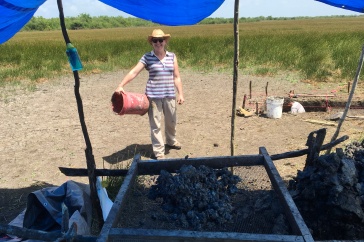Even if you weren’t born here, if you’ve stood in a long line outside town hall during the dismal month of March — perhaps in driving rain or blizzard conditions — to vote in the New Hampshire presidential primary election, you’ve earned the well-deserved (and not easily granted) moniker “Granite Stater.”
Primary season, that most anticipated of times in the state, falls every quadrennial. It’s a long season that starts about 18 months before the actual vote, when candidates — reporters in tow — press the flesh with voters on a very regular basis. The actual primary day falls roughly between Halloween and the time the first crocuses pop up in the yard. And, importantly, it falls before any other primary election in the country.
But it almost didn’t.
An accident of history

Andrew Smith (left) and Dante Scala will teach the six-week online course FIRST! Understanding New Hampshire’s Presidential Primary this fall.
In 1915, a New Hampshire lawmaker proposed a bill that would have set the state’s primary election during the third week of May, says Andrew Smith, director of the UNH Survey Center, who will co-teach the free and online six-week course FIRST! Understanding New Hampshire’s Presidential Primary this fall with Dante Scala, associate professor of political science.
Imagine what it would be like to vote in short-sleeves with the fragrance of lilac blossoms wafting through the air as you queue up. If that seems about as normal to you as drizzling imitation maple syrup on your breakfast pancakes, you can thank the state’s frugal forebears for squashing that legislation, pointing out that a May primary would require lighting and heating town halls across the state twice.
Instead, legislators set the primary date to coincide with town meeting day, which had occurred on the second Tuesday of March since the early 1800s. Thus, it was Yankee frugality rather than a codified plan that made New Hampshire’s first primary in 1916 one of the earliest in the nation.
But, Smith notes, “Nobody paid much attention to primaries back then. Candidates would compete in a couple of primaries to show they had public support, but they really weren’t competing for delegates in the primaries, that was done behind the scenes.” Although Republicans had a more open process, historically, and had held more primaries, as recently as the late 1960s, it was Democratic Party leaders in smoke-filled rooms deciding whom their nominees would be.
That changed after the McGovern-Fraser reforms.
Primaries become primary
Despite alienating many liberals by toeing the line on U.S. war policy during his time as Lyndon B. Johnson’s vice president, Hubert Humphrey won the nomination at the 1968 Democratic National Convention without competing in a single primary.
“There were a lot of angry Democratic voters, many of whom were anti-war, who were upset that Humphrey got the nomination despite not getting a single vote in a primary,” Smith says.
The convention created a commission headed by then Sen. George McGovern and Rep. Donald Fraser — the Commission on Party Structure and Delegate Selection, popularly known as the McGovern-Fraser commission — that set rules for how Democrats would vote on delegates for the national convention. The commission basically said the party needed a much more democratic system — either a caucus or a primary — for choosing delegates.
“What the commission really did was get rid of the whole idea that you could run for president and not compete,” Smith says. “Now primaries became important.”
Especially early primaries.
McGovern, who resigned from the commission in 1971 to run for president, campaigned heavily in New Hampshire and other early states. He was the first candidate to understand the importance of the momentum-building early primaries, Smith says.
“Why else would New Hampshire be important? We’re such a small state, we have so few delegates; it doesn’t really matter if you win New Hampshire or not in terms of actually getting delegates at the convention. It’s the momentum that’s important, to show that you can win in an early state.”
McGovern won the nomination in 1972. Four years later, Jimmy Carter clinched the nomination using a similar strategy around the early primaries.
“So now not only do the candidates understand that’s how you can win the nomination, but states begin realizing the importance of the early primary. That’s when you saw other states begin to move their primaries earlier and earlier,” Smith says. And New Hampshire’s primary moved in concert when state leaders abandoned the set date in March in favor of a more flexible approach.
Here comes the cliffhanger
So why has New Hampshire been able to retain first-in-the-nation primary status despite the jockeying of other states? The answer to that, and many other details that make the New Hampshire primary a fascinating topic, will be discussed in the class. Smith and Scala say participants will gain not only an historical perspective on the primary but also a better appreciation of how elections and primaries actually work, and how different they are from one another.
They’ll also get to talk shop during discussion periods with the two leading scholars on the subject; both Smith and Scala have written books on the topic, and they field thousands of calls from the media during primary season. So far, more than 600 individuals from locales across the globe have registered for the course.
The world watches, Smith says. “International press and political leaders come here to understand what’s going on with the primary, not only as an exercise in democracy but also to understand who’s going to be the next president — what they should know about that person. The rest of the world is very, very concerned about who the next United States president will be.”
Smith hopes that aside from shedding light on the primary, the class will also inspire participants to head to the state during the week between the Iowa caucuses and the New Hampshire primary and immerse themselves in the experience.
“Go to Manchester,” he says. “See the media circus, the political circus,” he says. “It’s like political Disneyland.”
FIRST! Understanding New Hampshire’s Presidential Primary runs October 19 through November 30. Upon conclusion, the class will be archived online and free for taking; however, the opportunity to participate in active discussion groups with Smith and Scala will be limited to live class participants.
The 2016 New Hampshire primary — the state’s 100th — is currently scheduled for Feb. 9, 2016, but that could change depending on the movement of primaries in other states. The official date will be set by New Hampshire Secretary of State Bill Gardner ’70 sometime in November.
-
Written By:
Tracey Bentley | Communications and Public Affairs
















































